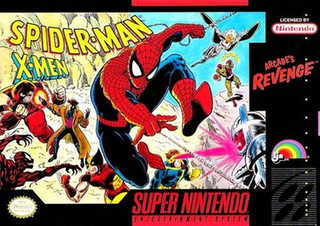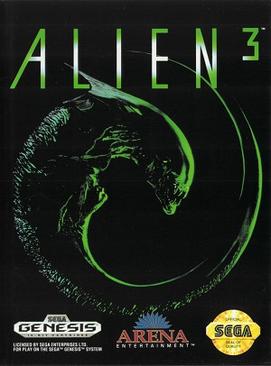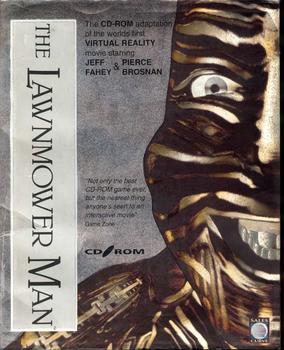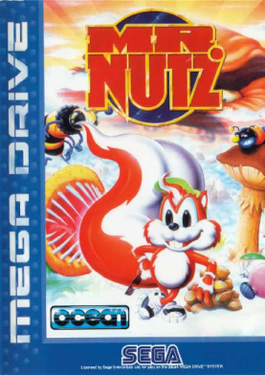
WWF WrestleMania 2000 is a professional wrestling video game released in 1999 on the Nintendo 64 (N64) console. It was based on the World Wrestling Federation's annual pay-per-view, WrestleMania. Despite the fact that this game is based upon WrestleMania 2000, the game was released five months prior to the actual PPV itself, therefore resulting in the game using the stage design from the 1999 event, WrestleMania XV, instead. Released at the height of the WWF's Attitude Era, WrestleMania 2000 was the first WWF game released by THQ. The wrestling company ended its long relationship with Acclaim Entertainment after witnessing the video game success of its competitor, World Championship Wrestling (WCW), on behalf of THQ. WrestleMania 2000 shares its game engine with the Japan-only release Virtual Pro Wrestling 2: Ōdō Keishō.

Total Carnage is a multidirectional shooter arcade video game originally developed and published by Midway in North America in January 1992. Set in the fictional country of Kookistan during 1999, players assume the role of Captain Carnage and Major Mayhem from the Doomsday Squad in a last-ditch effort to overthrow dictator General Akhboob and his army of mutants from conquering the world, while also rescuing POWs held by his military force.

The Genesis, also known as the Mega Drive outside North America, is a 16-bit fourth generation home video game console developed and sold by Sega. It was Sega's third console and the successor to the Master System. Sega released it in 1988 in Japan as the Mega Drive, and in 1989 in North America as the Genesis. In 1990, it was distributed as the Mega Drive by Virgin Mastertronic in Europe, Ozisoft in Australasia, and Tectoy in Brazil. In South Korea, it was distributed by Samsung Electronics as the Super Gam*Boy and later the Super Aladdin Boy.

There have been several video games based on the 1991 film Hook. A side-scrolling platform game for the Nintendo Entertainment System (NES) and Game Boy was released in the United States in February 1992. Subsequent side-scrolling platform games were released for the Commodore 64 and the Super Nintendo Entertainment System (SNES), and an arcade beat ‘em up by Irem later in 1992, followed by versions for the Sega CD, Sega Genesis, and Sega's handheld Game Gear console in 1993.

Mickey Mania: The Timeless Adventures of Mickey Mouse is a 1994 platform video game developed by Traveller's Tales and published by Sony Imagesoft for the Super NES, Sega Genesis, and Sega CD. In the game, the player controls Mickey Mouse, who must navigate through various side-scrolling levels, each designed and based on classical Mickey Mouse cartoons. The game was later released on the PlayStation in 1996 as Mickey's Wild Adventure in PAL regions by Sony Computer Entertainment, Sony Imagesoft's successor. A second game, Mickey Mania 2, was intended to be released but was cancelled due to Traveller's Tales focusing on other games.

Spider-Man and the X-Men in Arcade's Revenge is a video game released for the Super NES in 1992 by LJN. It was released for the Genesis and Game Gear as well as the Game Boy. The game features Marvel Comics characters Spider-Man and the X-Men as they battle their captor, the villainous Arcade.

American Gladiators is a video game developed by Incredible Technologies and released in 1991 by GameTek for the Nintendo Entertainment System. Ports were published in 1992 for Amiga, Genesis, Super NES, and MS-DOS compatible operating systems. It is based on the 1989 television game show American Gladiators.

WWF WrestleMania is a professional wrestling arcade game released by Midway Manufacturing Co. in 1995. It is based on the World Wrestling Federation (WWF) professional wrestling promotion.

RoboCop 3 is a video game based on the 1993 film of the same name. Amiga, Atari ST and DOS versions were developed by Digital Image Design beginning in September 1990, and published by Ocean Software in December 1991. The Digital Image Design version includes multiple gameplay styles. During 1992 and 1993, other versions consisting of side-scrolling platform gameplay were released for the Commodore 64, ZX Spectrum, NES, Super NES, Game Gear, Master System, and Sega Genesis.

The Lion King is a platform game based on Disney's 1994 animated film The Lion King. The game was developed by Westwood Studios and published by Virgin Interactive Entertainment for the Super NES and Genesis in 1994, and was ported to MS-DOS, Amiga, Game Gear, Master System, and Nintendo Entertainment System. The Amiga, Master System, and NES versions were only released in the PAL region. It is the final licensed NES game worldwide. The game follows Simba's journey from a young cub to the battle with his uncle Scar as an adult.

Alien 3 is a run and gun game based on the 1992 film of the same name. It was released for the Genesis and Amiga in 1992, then for the Commodore 64, Game Boy, Game Gear, Nintendo Entertainment System, Super Nintendo Entertainment System, and Master System.

WWF WrestleMania is a Nintendo Entertainment System (NES) video game created by Rare and published by Acclaim Entertainment in 1989. It was the first WWF licensed NES game and the second WWF game overall, the first being MicroLeague Wrestling. WrestleMania also marked the beginning of a long relationship between Acclaim and the WWF which lasted ten years. Released just months prior to WrestleMania V, it was intended to help build up to that event. The game's title screen features the tagline for WrestleMania III: "Bigger. Better. Badder".

The Addams Family is a platform game based on the 1991 film of the same name and developed and published by Ocean Software. It was released for home consoles such as the Super Nintendo Entertainment System, computers such as the Amiga, and handheld consoles like the Game Boy.

Disney's Ariel the Little Mermaid, usually shorted to simply Ariel the Little Mermaid, is a 1992 video game developed by BlueSky Software for the Sega Genesis, Game Gear and Master System, based on the 1989 film The Little Mermaid.

The Lawnmower Man is a video game based on the 1992 film of the same name. The game was published in Japan by Coconuts Japan (ココナッツジャパンエンターテイメント) under the title Virtual Wars.

WWF Royal Rumble is a professional wrestling video game released in 1993 for the Super NES and Sega Genesis. Like its predecessor, WWF Super WrestleMania, it is based on the World Wrestling Federation (WWF). It features a variety of match types, including the newly added Royal Rumble match. The game's roster consists of wrestlers who were top stars in the WWF at the time, and each version of the game has five exclusive playable characters.

Mr. Nutz is a 2D side-scrolling platform game published by Ocean Software. It was released for the Super Nintendo Entertainment System in late 1993 in Europe and in North America and Japan in 1994. In 1994, it was released for the Mega Drive as Ocean's first Sega game, and on the Game Boy. It was also released on the Sega Channel in 1995, the Game Boy Color in 1999, and remade for the Game Boy Advance in 2001.

The Lost Vikings is a puzzle-platform game developed by Silicon & Synapse and published by Interplay. It was originally released for the Super NES in 1993, then subsequently released for the Amiga, Amiga CD32, MS-DOS, and Mega Drive/Genesis systems; the Mega Drive/Genesis version contains five stages not present in any other version of the game, and can also be played by three players simultaneously. Blizzard re-released the game for the Game Boy Advance in 2003. In 2014, the game was added to Battle.net as a free download emulated through DOSBox. In celebration of the company's 30th anniversary, The Lost Vikings was re-released for Microsoft Windows, Nintendo Switch, PlayStation 4 and Xbox One as part of the Blizzard Arcade Collection in February 2021.
















